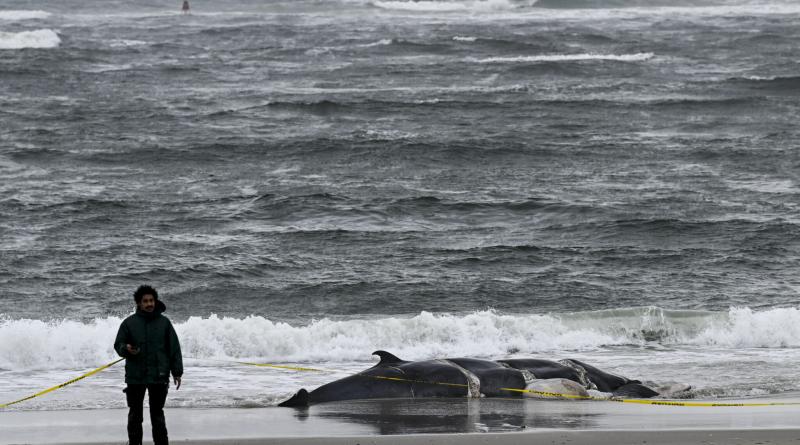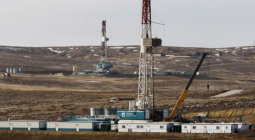Republicans Propose Nationwide Offshore Wind Ban, Citing Unsubstantiated Links to Whale Deaths

A new GOP bill calls for a moratorium on wind farms after dozens of dead whales washed ashore since December. Scientists say no evidence suggests wind projects are to blame.
Republican lawmakers and right-wing political groups are doubling down on their calls for the Biden administration to temporarily halt all development of offshore wind farms along U.S. coasts after 8 dolphins found stranded on a New Jersey beach this week died. It’s the latest incident to fuel a heated, monthslong debate over the potential environmental impacts of offshore wind energy that experts say has become mired in conspiracy theories and misinformation.
Some 23 dead whales have washed ashore along the East Coast since early December, including a dozen in New Jersey and New York, where several offshore wind projects are moving forward in different stages of development. That has led some people, including Republican Rep. Jeff Van Drew of New Jersey, to blame those deaths on the projects, despite the vast majority of them still being sited and planned by developers that have yet to begin construction.
“Pro-wind activists and the Biden admin are hiding the REAL issues of offshore wind development from the public, and many in our media are refusing to properly examine these concerns,” Van Drew, who sits on the U.S. House Judiciary Committee, tweeted on Thursday. “They hurt the environment, raise energy prices, & will destroy existing industry.”
Viral posts on social media have blamed the recent whale deaths on everything from the noise created by seismic surveying techniques used by wind companies to map the ocean floor to the building of the wind farms themselves—a particularly strange accusation, considering none of the 20 proposed wind farms along the East Coast have begun construction. While the 132-megawatt South Fork Wind project in New York and the 800-megawatt Vineyard Wind project in Massachusetts were federally approved last year, neither projects are currently being built, the Bureau of Ocean Energy Management said in an email.
Riding that momentum, Republicans are now leading a new effort in Congress to halt all offshore wind development in the country. On Tuesday, Van Drew and several other Republicans, including Rep. Marjorie Taylor Greene, introduced a resolution urging the White House to impose a nationwide moratorium on offshore wind projects until further studies are conducted on the industry’s potential environmental and economic impacts.
But federal scientists and career marine conservationists have repeatedly pushed back on claims that offshore wind is behind the recent whale deaths. The National Oceanic and Atmospheric Administration has said there’s no evidence suggesting that current operations from East Coast wind energy projects are harming marine life. Contrary to the Republicans’ claims, the agency’s scientists have said there is significant empirical evidence that whales and other marine mammals are being increasingly harmed and killed by collisions with ships, entanglements with fishing gear and as a general result of worsening plastic pollution and global warming.
“At this point, the link between offshore wind surveys and the recent whale deaths is speculative and not supported by scientific literature or other data,” Lauren Gaches, spokesperson for NOAA Fisheries, said in a statement to Inside Climate News. “Since December 1, 2022, injuries consistent with vessel strike were identified in many of the animals necropsied, although confirmation is pending analysis of samples collected during the examination.”
In fact, scientists have been sounding the alarm over surging whale deaths since 2016, suggesting the recent incidents involving beached whales are actually part of a larger trend that began well before any of the East Coast was slated for offshore wind development. In 2017, NOAA declared an “unusual mortality event” for both the North Atlantic right whale and the Atlantic humpback whale—the two species that have been washing up dead along the East Coast in recent months. And many researchers have pointed out that this winter’s slew of whale strandings look strikingly similar to those that occurred from December 2016 through February 2017 in Virginia and North Carolina.
Additionally, while scientists say no single cause is likely to blame, evidence so far overwhelmingly points to increased ship traffic and entanglements with fishing gear as the main culprits. At least 178 humpback whales have died between the coasts of Maine and Florida since 2016. Half of those whales have been necropsied, with 40 percent of those showing evidence that the animal was struck by a vessel or entangled in fishing gear. NOAA found similar evidence for at least 15 right whales during that same timespan. Shipping traffic in the Atlantic Ocean has also jumped 34 percent over the last five years, a 2022 study found.
But that evidence hasn’t stopped mounting opposition to U.S. offshore wind farms, some of which is being funded by the fossil fuel industry, according to recent reports from HuffPost and Fast Company. The issue has been especially problematic when it comes to online disinformation about wind energy, experts have warned.
According to a new report by Media Matters, a progressive watchdog group, posts about wind energy on Facebook between January and March of this year were dominated by right-leaning political groups and conservative media outlets, including Fox News, that spread misleading or false claims suggesting wind energy was contributing to whale deaths.
Of the 288 posts that mentioned wind energy during those months, nearly 84 percent of them specifically noted the unsubstantiated claim that offshore wind farms impact whale populations, the report said, with none of the posts getting fact-checked by Facebook. It’s the latest report to criticize Big Tech companies for their role in spreading online disinformation—something activists say is now a major barrier to achieving meaningful climate action.
Efforts to deploy both wind and solar energy have ramped up significantly in recent years, driven in large part by recent federal climate policies. As part of his larger aim to slash U.S. greenhouse gas emissions by half in seven years, President Joe Biden has set a goal of deploying 30 gigawatts of offshore wind by 2030. The Inflation Reduction Act also allocates $100 million for offshore wind projects and reopened additional public waters to offshore wind leases in the Gulf of Mexico and along the Atlantic coast.
“This has become the perfect opportunity for anti-renewable activists and fossil fuels industry shills posing as environmentalists sympathetic to the plight of whales to launch a public relations and legal campaign in opposition to these offshore wind projects,” the Media Matters report said. “Right-wing media, and particularly Fox News, have propelled these efforts in response to Biden’s push for offshore wind.”
Kristoffer Tigue
Reporter, New York City
Kristoffer Tigue is a New York City-based reporter for Inside Climate News, where he covers environmental justice issues, writes the Today’s Climate newsletter and manages ICN’s social media. His work has been published in Reuters, Scientific American, Public Radio International and CNBC. Tigue holds a Master’s degree in journalism from the Missouri School of Journalism, where his feature writing won several Missouri Press Association awards.
cover photo: A dead whale is found on Rockaway Beach in the Queens Borough in New York City, United States on Feb. 17, 2023. Credit: Fatih Aktas/Anadolu Agency via Getty Images





